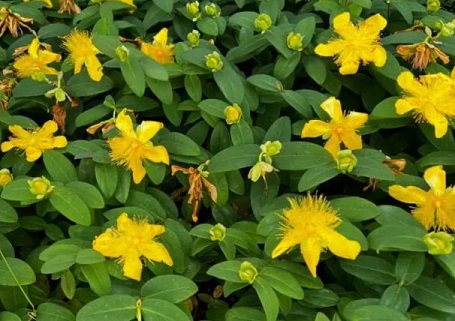French study finds that a phytochemical from St. John’s Wort shows promise as a broad-spectrum antiviral against coronaviruses
Nikhil Prasad Fact checked by:Thailand Medical News Team Aug 10, 2024 1 year, 4 months, 4 weeks, 16 hours, 7 minutes ago
Herbs And Phytochemicals: As the world continues to grapple with the COVID-19 pandemic, caused by the SARS-CoV-2 virus, the search for effective antiviral treatments remains critical. Researchers from various institutions in France, including the University of Lille, Institut Pasteur de Lille, and the CNRS, have identified a potential game-changer in the fight against coronaviruses: hyperforin, a natural compound found in St. John’s wort. This
Herbs And Phytochemicals news report delves into their groundbreaking study, which reveals hyperforin’s potent antiviral properties against a range of human coronaviruses, suggesting its potential as a broad-spectrum antiviral agent.
 French study finds that a phytochemical from St. John’s Wort shows promise as a
French study finds that a phytochemical from St. John’s Wort shows promise as a
broad-spectrum antiviral against coronaviruses
Understanding Coronaviruses and the Challenge
Coronaviruses are a large family of viruses known for causing respiratory illnesses in humans, ranging from the common cold to more severe diseases such as SARS, MERS, and COVID-19. The urgency to find broad-spectrum antiviral drugs has never been more evident, especially in light of the ongoing pandemic. Currently, the options for treating COVID-19 are limited, with only a few FDA-approved drugs, such as remdesivir and molnupiravir, available. However, these treatments have limitations, including issues with bioavailability and the potential for resistance, underscoring the need for new therapeutic approaches.
The Discovery of Hyperforin’s Antiviral Activity
In the quest for new antiviral agents, the research team turned to natural products, which have long been a source of medicinal compounds. Hyperforin, a major component of St. John’s wort, has been used in traditional medicine, particularly for treating depression. The researchers hypothesized that hyperforin might also possess antiviral properties, given its structural characteristics and previous studies suggesting its potential against various pathogens.
To test this hypothesis, the team conducted a series of antiviral assays using human cell cultures infected with four types of human coronaviruses, including the highly virulent SARS-CoV-2, SARS-CoV, and MERS-CoV, as well as the milder HCoV-229E.
Their findings were striking: hyperforin demonstrated significant antiviral activity against all tested coronaviruses, with IC50 values (the concentration required to inhibit the virus by 50%) ranging from 0.24 to 2.55 µM.
How Hyperforin Works: Targeting the Virus After It Enters the Cell
One of the key questions the researchers sought to answer was how hyperforin exerts its antiviral effects. Through a series of time-of-addition assays, they discovered that hyperforin acts at a post-entry step in the viral life cycle, likely during the replication phase. This means that hyperforin doesn’t prevent the virus from entering human cells but instead interferes with its ability to replicate once inside. This finding
is particularly important because the replication phase is a critical target for antiviral drugs.
Further experiments in human primary airway epithelial cells, which serve as a preclinical model for coronavirus infections, confirmed hyperforin’s efficacy. The compound significantly reduced the levels of viral RNA both inside the cells and in the surrounding environment, reinforcing the notion that hyperforin could effectively inhibit the replication of coronaviruses in the human respiratory tract.
Combining Forces: Hyperforin and other antivirals
Given the promising results, the researchers explored whether hyperforin could be used in combination with existing antiviral drugs, such as remdesivir, to enhance its efficacy. The results were encouraging: when combined with remdesivir, hyperforin displayed an additive antiviral effect, meaning that the two drugs together were more effective than either one alone. This synergistic effect suggests that hyperforin could potentially be used in combination therapies to treat COVID-19 and other coronavirus-related diseases, helping to mitigate the risk of resistance and improve patient outcomes.
The Potential of Hyperforin in Treating Coronaviruses
The implications of these findings are significant. Hyperforin’s broad-spectrum antiviral activity suggests that it could be an effective treatment not only for current coronaviruses but also for future strains that may emerge. This is particularly relevant in the context of pandemic preparedness, where having a versatile antiviral agent could be crucial in controlling outbreaks of new viral pathogens.
Moreover, the fact that hyperforin is derived from a widely available plant product means that it could be produced and distributed relatively easily, making it an attractive candidate for further development. However, before hyperforin can be used as a treatment in humans, additional research is needed to better understand its pharmacokinetics - how the drug is absorbed, distributed, metabolized, and excreted in the body - and to determine the optimal dosage and administration route.
Conclusion: A Promising New Tool in the Fight Against Coronaviruses
The study findings represents a significant step forward in the search for new antiviral therapies. Hyperforin, the major metabolite of St. John’s wort, has shown potent antiviral activity against a range of human coronaviruses, including those responsible for COVID-19, SARS, and MERS. By targeting the replication phase of the viral life cycle, hyperforin could serve as a valuable addition to the arsenal of treatments available for combating these and potentially other emerging viral threats.
The potential for hyperforin to be used in combination with existing antiviral drugs like remdesivir further enhances its appeal, offering the possibility of more effective and resilient treatment regimens. While more research is needed to fully realize this potential, the findings of this study are a promising indication that hyperforin could play a crucial role in the global effort to control and prevent coronavirus infections.
The study findings were published in the peer-reviewed journal: Frontiers in Microbiology.
https://www.frontiersin.org/journals/microbiology/articles/10.3389/fmicb.2024.1443183/full
For the latest on
Herbs And Phytochemicals, keep on logging to Thailand Medical News.
Read Also:
https://www.thailandmedical.news/news/arctigenin-found-in-forsythia-viridissima-shows-promise-against-human-coronavirus
https://www.thailandmedical.news/news/terpenes-from-plants-belonging-to-the-fabaceae-family-show-potential-to-treat-covid-19
